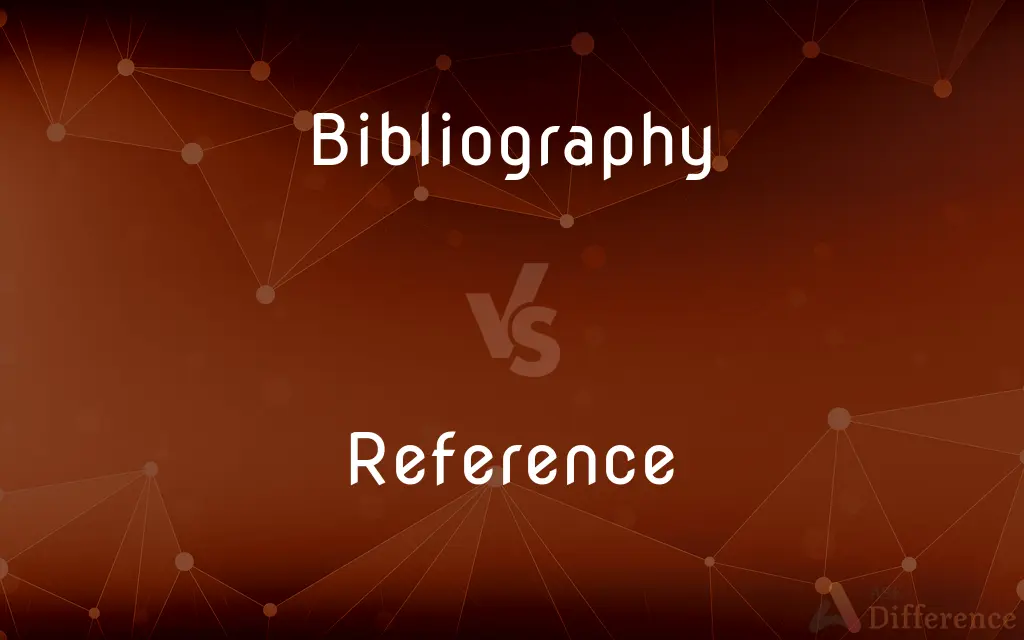Bibliography vs. Reference — What's the Difference?
By Tayyaba Rehman & Maham Liaqat — Updated on March 11, 2024
A bibliography is a comprehensive list of all sources used, while a reference specifies direct citations within a work.

Difference Between Bibliography and Reference
Table of Contents
ADVERTISEMENT
Key Differences
A bibliography includes all the materials and sources consulted for background reading or research, regardless of whether they are directly cited in the work. It provides a broader scope, encompassing everything that influenced the research, including books, articles, and even conversations. References, on the other hand, are more focused. They specifically list the works that are directly cited or quoted within the text. References are crucial for validating claims and arguments made in the work, allowing readers to trace the original sources of information.
The purpose of a bibliography extends beyond just citation. It serves as an acknowledgment of the contributions of other researchers and sources to the work's intellectual backdrop. In contrast, the reference list is integral to the academic integrity of a work. It ensures transparency by directly linking the text's claims and ideas to their original sources.
The format of a bibliography can be more varied than that of a reference list. Since a bibliography encompasses a wider array of sources, it might include annotations or brief descriptions of the sources' relevance or quality. Conversely, references are typically presented in a standardized format, dictated by specific citation styles like APA, MLA, or Chicago. This uniformity makes it easier for readers and scholars to identify and locate the cited works, ensuring the accuracy and reliability of the academic conversation.
Comparison Chart
Definition
List of all sources read or consulted for background research.
List of works directly cited or quoted within the text.
Purpose
To acknowledge all influences and provide additional reading material.
To credit specific sources and support claims made in the text.
ADVERTISEMENT
Inclusion
May include sources not directly cited in the text.
Only includes sources directly cited or quoted.
Format
Can be more varied, sometimes including annotations.
Follows specific citation style guidelines without annotations.
Academic Role
Offers a broader view of the research's background and context.
Ensures academic integrity and facilitates source verification.
Compare with Definitions
Bibliography
A comprehensive list of sources on a specific topic.
The bibliography at the book's end provided a vast array of further reading.
Reference
A citation within a text to a source of information.
Each statement was backed up with a reference to peer-reviewed studies.
Bibliography
A section in academic works listing all consulted sources.
Her thesis included an extensive bibliography, showcasing her thorough research.
Reference
A source used to provide evidence or support.
The report used government documents as its main references.
Bibliography
A publication listing works by a specific author or on a specific subject.
The scholar published a bibliography of medieval manuscripts.
Reference
The list of cited works at the end of an academic paper.
Her paper's reference list was meticulously formatted according to APA style.
Bibliography
An annotated list providing source descriptions.
The project's bibliography included insightful annotations about each source's relevance.
Reference
An act of mentioning or alluding to something.
His speech made several references to historical events.
Bibliography
The discipline of systematically listing books and publications.
He specialized in bibliography, focusing on rare books.
Reference
A section in books or articles directing readers to external sources.
The chapter concluded with a detailed reference section for further investigation.
Bibliography
Bibliography (from Ancient Greek: βιβλίον, romanized: biblion, lit. 'book' and -γραφία, -graphía, 'writing'), as a discipline, is traditionally the academic study of books as physical, cultural objects; in this sense, it is also known as bibliology (from Ancient Greek: -λογία, romanized: -logía). English author and bibliographer John Carter describes bibliography as a word having two senses: one, a list of books for further study or of works consulted by an author (or enumerative bibliography); the other one, applicable for collectors, is "the study of books as physical objects" and "the systematic description of books as objects" (or descriptive bibliography).
Reference
Reference is a relationship between objects in which one object designates, or acts as a means by which to connect to or link to, another object. The first object in this relation is said to refer to the second object.
Bibliography
A list of the works of a specific author or publisher.
Reference
The act of referring to something
Filed away the article for future reference.
Bibliography
A list of writings relating to a given subject
A bibliography of Latin American history.
Reference
Significance for a specified matter; relation or relationship
Her speeches have special reference to environmental policy.
Bibliography
A list of writings used or considered by an author in preparing a particular work.
Reference
Meaning or denotation
The reference of the word “lion” is to a kind of wild cat.
Bibliography
The description and identification of the editions, dates of issue, authorship, and typography of books or other written material.
Reference
A mention of an occurrence or situation
Made frequent references to her promotion.
Bibliography
A compilation of such information.
Reference
A note in a publication referring the reader to another passage or source.
Bibliography
A section of a written work containing citations, not quotations, to all the books referred to in the work.
Reference
The passage or source so referred to.
Bibliography
A list of books or documents relevant to a particular subject or author.
Reference
A work frequently used as a source.
Bibliography
The study of the history of books in terms of their classification, printing and publication.
Reference
A mark or footnote used to direct a reader elsewhere for additional information.
Bibliography
A history or description of books and manuscripts, with notices of the different editions, the times when they were printed, etc.
Reference
Submission of a case to a referee.
Bibliography
A list of books or other printed works having some common theme, such as topic, period, author, or publisher.
Reference
Legal proceedings conducted before or by a referee.
Bibliography
A list of the published (and sometimes unpublished) sources of information referred to in a scholarly discourse or other text, or used as reference materials for its preparation.
Reference
A person who recommends another or who can vouch for another's fitness or qualifications, as for a job.
Bibliography
The branch of library science dealing with the history and classification of books and other published materials.
Reference
A statement about a person's qualifications, character, and dependability.
Bibliography
A list of writings with time and place of publication (such as the writings of a single author or the works referred to in preparing a document etc.)
Reference
To supply (a text) with references
The author hadn't adequately referenced the third chapter, so the copyeditor suggested adding more citations. This article is thoroughly referenced with up-to-date sources.
Reference
To cite as a reference
The monograph doesn't reference any peer-reviewed articles.
Reference
Usage Problem To mention or allude to
The comedian's monologue referenced many Hollywood stars.
Reference
A relationship or relation (to something).
Reference
A measurement one can compare (some other measurement) to.
Reference
Information about a person, provided by someone (a referee) with whom they are well acquainted.
Reference
A person who provides this information; onlyn in UK English: a referee.
Reference
A reference work.
Reference
(attributive) That which serves as a reference work.
Reference Dictionary of Linguistics
Reference
The act of referring: a submitting for information or decision.
Reference
(semantics) A relation between objects in which one object designates, or acts as a means by which to connect to or link to, another object.
Reference
(academic writing) A short written identification of a previously published work which is used as a source for a text.
Reference
(academic writing) A previously published written work thus indicated; a source.
Reference
(computing) An object containing information which refers to data stored elsewhere, as opposed to containing the data itself.
Reference
A special sequence used to represent complex characters in markup languages, such as
™ for the ™ symbol.Reference
(obsolete) Appeal.
Reference
To provide a list of references for (a text).
You must thoroughly reference your paper before submitting it.
Reference
To refer to, to use as a reference.
Reference the dictionary for word meanings.
Reference
To mention, to cite.
In his speech, the candidate obliquely referenced the past failures of his opponent.
Reference
(programming) To contain the value that is a memory address of some value stored in memory.
The given pointer will reference the actual generated data.
Reference
The act of referring, or the state of being referred; as, reference to a chart for guidance.
Reference
That which refers to something; a specific direction of the attention; as, a reference in a text-book.
Reference
Relation; regard; respect.
Something that hath a reference to my state.
Reference
One who, or that which, is referred to.
Reference
The act of submitting a matter in dispute to the judgment of one or more persons for decision.
Reference
Appeal.
Reference
A remark that calls attention to something or someone;
She made frequent mention of her promotion
There was no mention of it
The speaker made several references to his wife
Reference
A short note recognizing a source of information or of a quoted passage;
The student's essay failed to list several important citations
The acknowledgments are usually printed at the front of a book
The article includes mention of similar clinical cases
Reference
An indicator that orients you generally;
It is used as a reference for comparing the heating and the electrical energy involved
Reference
A book to which you can refer for authoritative facts;
He contributed articles to the basic reference work on that topic
Reference
A formal recommendation by a former employer to a potential future employer describing the person's qualifications and dependability;
Requests for character references are all to often answered evasively
Reference
The most direct or specific meaning of a word or expression; the class of objects that an expression refers to;
The extension of `satellite of Mars' is the set containing only Demos and Phobos
Reference
The act of referring or consulting;
Reference to an encyclopedia produced the answer
Reference
A publication (or a passage from a publication) that is referred to;
He carried an armful of references back to his desk
He spent hours looking for the source of that quotation
Reference
The relation between a word or phrase and the object or idea it refers to;
He argued that reference is a consequence of conditioned reflexes
Reference
Refer to;
He referenced his colleagues' work
Common Curiosities
What is the main difference between a bibliography and a reference?
A bibliography is a comprehensive list of all sources consulted, while a reference is a list of sources directly cited within the work.
Is a reference list always required in academic writing?
Yes, a reference list is essential in academic writing to credit sources and support the work's claims.
How is a reference formatted?
A reference is formatted according to specific citation style guidelines, such as APA, MLA, or Chicago.
What kind of sources can be included in a bibliography?
A bibliography can include books, articles, websites, and even personal communications relevant to the research topic.
Why is a bibliography important?
A bibliography acknowledges the breadth of research conducted and guides readers to further resources on the topic.
How does a bibliography benefit the reader?
A bibliography provides a curated list of additional resources for readers interested in exploring the topic further.
What is the purpose of a reference?
The purpose of a reference is to credit the original sources of ideas or data mentioned in the work.
What does an annotated bibliography include?
An annotated bibliography includes a brief description or evaluation of each source's relevance or quality.
Can a bibliography include sources not cited in the text?
Yes, a bibliography can include sources that were read or consulted for background information but not directly cited.
Can the terms bibliography and reference be used interchangeably?
No, they serve different purposes and should not be used interchangeably.
How do citation styles affect reference formatting?
Different citation styles have specific rules for formatting references, affecting how information like author names and publication dates is presented.
Can a work have both a bibliography and a reference list?
Yes, some works include both, with the bibliography providing a broader context and the reference list focusing on directly cited sources.
How do references contribute to academic integrity?
References prevent plagiarism by crediting original sources, supporting scholarly communication and verification.
Is it necessary to include a bibliography in every research paper?
Not every research paper requires a bibliography; it depends on the research scope and the citation style guidelines.
What is the role of a reference in academic discourse?
References facilitate the scholarly exchange of ideas by allowing readers and researchers to trace and verify the sources of information used in academic work.
Share Your Discovery

Previous Comparison
Vulture vs. Hawk
Next Comparison
Lick vs. ClickAuthor Spotlight
Written by
Tayyaba RehmanTayyaba Rehman is a distinguished writer, currently serving as a primary contributor to askdifference.com. As a researcher in semantics and etymology, Tayyaba's passion for the complexity of languages and their distinctions has found a perfect home on the platform. Tayyaba delves into the intricacies of language, distinguishing between commonly confused words and phrases, thereby providing clarity for readers worldwide.
Co-written by
Maham Liaqat













































